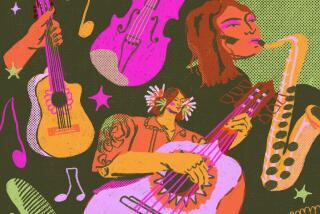MUSIC REVIEW : Rich Trip Through Castellan Countryside
- Share via
SAN JUAN CAPISTRANO — In opening a window to the traditional music of Spain, the quartet La Musgana rightly shifts the focus away from the flamenco guitar. Instead, the group interprets and presents songs of the Castellan countryside using such traditional instruments as the gaita charra y tamboril (pipe and tabor), zanfona (hurdy-gurdy) and zamora bagpipes and a variety of percussive instruments. The members add a contemporary flavor to the mix by also playing the bass and clarinet.
In the supple hands of La Musgana, which was formed in 1986, these diverse instruments combine both in celebration of weddings and dances and to heal wounded souls of the lost.
It is the variety and richness of life’s experience that this talented group captures so eloquently, both in concerts and on its new release “La Seis Tentaciones” (“The Six Temptations”).
In the La Sala auditorium at the San Juan Capistrano Regional Library Friday night, La Musgana--multi-instrumentalists Enrique Almendros, Carlos Beceiro, Luis Delgado and Jaime Munoz--delighted a packed house with an impressive 80-minute, 16-song set of instrumentals. The well-paced early set covered an array of material ranging from melancholy, delicate selections to upbeat, rollicking dance songs.
Selecting highlights from this enriching cultural experience would be about as easy as choosing one’s favorite album--where would one start?
With the hypnotic, pulsating rhythms concocted by Beceiro on bass and Almendros on pipe and tabor?
The seamless seques from such up-tempo dance numbers as “Pasacales de Bodas” to the gentler, more serene recollections that inspired the lovely “Tres Hermanicas?”
Or the simply heartfelt passion and gusto that fueled each musician to leave his own mark on the material?
Actually, one mesmerizing song did stand above the rest, and drew the biggest applause of the evening from an adoring audience. “Aire Religioso” is a traditional song played at important Masses. Played as a duet with focused intensity by Almendros on bagpipes and Beceiro on bass, its somber, spiritual nature lent a darker, metaphysical edge to the proceedings.
The seriousness of “Aire Religioso” was only a temporary departure, though, from the otherwise festive mood. Several dance tunes and a trio of wedding songs then lifted listeners’ spirits in tandem with Delgado’s big grin and frenzied tambourine tapping.
Throughout the program, the affable Delgado played host, whether introducing songs or offering wry commentary on life, love and marriage.
While there’s no denying that La Musgana (which means “the water rat”) brings contagious fun to the party, its most significant contribution well may be its ability to prove that music indeed can be a universal language, without boundaries. Muchos gracias, senores.
More to Read
The biggest entertainment stories
Get our big stories about Hollywood, film, television, music, arts, culture and more right in your inbox as soon as they publish.
You may occasionally receive promotional content from the Los Angeles Times.










